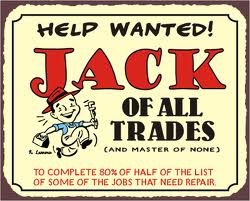Several months ago I wrote a post explaining that I didn’t want to be an Interaction Designer forever (you can read Confession: I don’t want to be an Interaction Designer forever here). I’ve been doing even more reading, thinking, discussing on the topic, and have come up with additional thoughts and issues for us, as a UX community, to think about. What I’m going to write about today is the fact that one of the main issues that we see, but at times ignore, in this field is that most of us try to be jacks of all trades within UX. We try to be, and at times are successful at being, the IA and the IxD and the Content Strategist and the Visual Designer. Now you may be thinking, ‘duh Lis, that is how this field works’. But I would argue that this is an issue, a big issue, for several reasons.
First, by UXers trying to accomplish the entire suite of UX work themselves, we deter UX from maturing as a profession. What do I mean by this? I mean that if we continue to do this, UX as a profession, especially in organizations, cannot grow. Since one person, or several people, can handle a large amount of variation in their work, there is no reason to learn about and understand, as an outsider of UX, the different parts of the field. Why would I need to learn what content strategy is vs. interaction design vs. research when you do it all? Further more why would I budget for those activities when I’m not sure what they are and their benefit, and why would I hire someone for a specific role, even if we need an in house researcher, if I have no reason to believe that you can’t handle it all. Remember, UX is all about the Benjamins right?
Second, by us being jacks of all trades it can stump our own individual growth. How many of you out there know what your career path is? Ok you can do wireframes, interviews, task analysis, etc… but what next? UX management? But you don’t want to be a manager. What else besides management is next for a UXer? We can’t answer that question, because there are not career paths that have been established in our field. This is because the roles we play are so spread out and generalized that it is almost impossible to focus on one track… in fact there isn’t only one track. This leaves it up to the individual to determine how they want to grow, and who has the time to do that when there are specs to write?

Last, having one person cover all the roles in UX stops an individual from being truly satisfied and happy as a professional. There are so many things for us to do in this field. Some of which we enjoy doing (I love research, discovery, strategy, etc yay!) and some of which we don’t (I tend not to enjoy specing, wireframing, etc… boo!). Because of the issues I’ve mentioned above, though, companies aren’t going to hire different people for both roles, because I can do it all! (there are other reasons too I’m sure, I’m just focusing on this discussion). Therefore, I’m constantly having to do work I don’t enjoy in order to get the work I do enjoy. This leaves me, at times, with a feeling of dissatisfaction. By focusing in on the things I want to do, and by having a mature profession that allows me to do that, I can find more individual professional happiness.
Ok, so I’ve exposed the elephant in the room (yes I think that an IA is different than an IxD) and I’ve explained why I think we have an issue. So what do I propose we do about it? First, I think we need to try to stop being jacks of all trade. I saw this great article on Freelance Switch about 5 mistakes that will end your career. Take a look at #3. Being a jack of all trades makes us mediocre instead of awesome. If we stop allowing ourselves to be a do it all shop, people and companies will be forced to hire different people for different roles. Then, you can concentrate and focus on the UX stuff that you like, as opposed to having to do it all.
Second, we need to support and advocate for this different roles. I can’t tell you how many times I’ve heard UXers scoff at the term content strategy (isn’t that just IA??). Well there was a gig where I got to work with a truly gifted content strategist, and it was the best thing ever! They did all the work that I hated doing, and frankly the work that I wasn’t very good at. This made our solution ten times better than it would have been, and I was ten times more satisfied with my work. Advocate for a split in roles instead of being scared you’re going to lose your job… if you’re good, you won’t.
Lastly, I think we need to be more active in and provide more assistance to our education system. We have some phenomenal programs out there today that teach UX. But, they can be even better with our input and suggestions. Talk to the people that are part of these programs and share your ideas and thoughts about the work in this community. By doing so, they can continue to improve the course work that students receive and better prepare people for the UX working world. Thus, new UXers will already come in not expecting to be do-it-all shops and we can stop the bleeding at the core.
Thus, what do I see as the implication to the UX future if we are able to turn this ship? I think that UX will mature as a profession. We’ll start to see career paths and companies/organizations will better understand what we do, as well as their high need for our skills. You, as an individual, will also start to be more satisfied with you work. Not having to do the sitemap (but being involved in it) when you hate doing sitemaps will allow you to concentrate on how the user interacts through the site, the stuff you like to do. And finally UX will start to be respected as a field, and will not be seen as a bunch of people that have no idea what to call themselves. It’s time that we started to grow up and see that we are no longer advocating just for our users’ sake, but we are advocating for our place in the professional realm. We cannot do that until we know what to call ourselves and we won’t know what to call ourselves until we better define who we are and what we do as individuals in UX.


